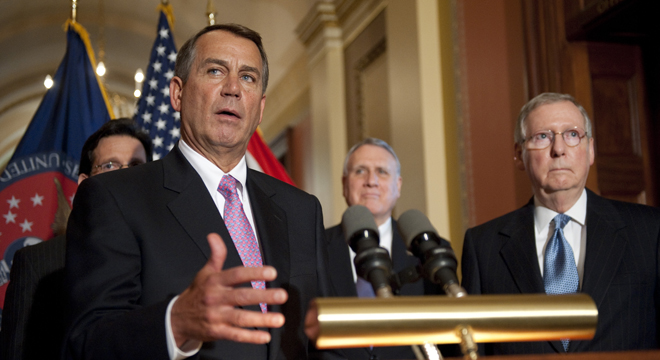For anyone who paid even passing attention to U.S. politics in 2011, the themes were loud and persistent: Republicans had stormed back into Washington to put an end to excessive government spending and runaway deficits, and would take no prisoners if Democrats stood in their way. The GOP’s bravado manifested in a series of partisan clashes over must-pass legislation, and climaxed in near economic calamity when Republicans refused to raise the federal debt limit.
Fast-forward to 2012 — the GOP’s leverage is gone, and the legislative landscape on Capitol Hill has fallowed. Republicans are still running on deficit reduction, but as the election nears, their governing agenda reveals something that close observers recognized all along: Deficit reduction was never the point. Whether acceding to political reality, or proactively moving messaging bills through the House, the GOP has quietly let on that they’re fine with deficits — as long as they come in the right flavors.
House Republican leaders began the year with an embarrassing defeat over extending the 2012 payroll tax holiday. Democrats held their ground and insisted that the payroll tax cut either be paid for with a mix of spending cuts and higher taxes on the wealthy, or not at all — no more of the GOP’s cuts-only approach. The GOP blinked and agreed to add more than $100 billion to the debt, rather than accept even a penny in higher taxes on the wealthy, or face the blame for allowing the payroll tax cut to lapse.
Weeks later, Republicans unveiled their new budget, written by Rep. Paul Ryan, which includes steep tax cuts and military-spending increases — both of which run counter to the deficit-cutting ethos to which the GOP laid claim. Some of their own conservative members have grumbled that the plan does not adequately deal with the deficit.
“We took a pledge, and we said we would cut more than is being cut,” Rep. Louie Gohmert (R-TX) said after the budget was unveiled.
The contrast is particularly stark this week: Senate Republicans blocked the Buffett Rule, dismissing its capacity to raise $47 billion over 10 years, while House Republicans are pushing a broad business tax cut that would add $46 billion to the deficit in just one year. On top of that, House committees are now looking for ways to override automatic cuts to defense spending they agreed to last August as a means of enforcing the controversial debt-limit deal.
“I’ve been very disappointed,” House Minority Whip Steny Hoyer (D-MD) said Tuesday at his weekly press conference, referring to Republican actions on the deficit. “On the one hand, voting against [the Buffett Rule, which asks] the best off among us to make some additional contributions, and then turning around and saying the best off among us ought not to do more, they ought to do less. … Continuing to blow holes in revenues will not [help the economy].”
Underlying this story is a broader GOP strategy of using deficits as a cudgel to attack Democrats when they come to power and use legislative leverage to force cuts to federal programs. Democrats yielded to the GOP for the first half of 2011. But small government isn’t synonymous with responsible budgeting, and when Democrats demanded that Republicans look to the other side of the federal ledger to reduce deficits, the GOP implicitly acknowledged that bringing the budget closer to balance wasn’t their real priority.
Democrats say they’re still willing to address deficits with the GOP, but only under a more balanced approach. Republicans so far haven’t budged, and many would rather see wholesale changes to the rules of governing than make concessions to grapple seriously with the issue that they put on the national agenda.
“I think what it’s going to take is our presidential nominee must call for a mandate to demand that congress pass a constitutional amendment for a balanced budget, out of the House and Senate, to the states for ratification,” Rep. Steve King (R-IA) told TPM in the Capitol on Tuesday. “The rest of this isn’t going to get the job done.”










